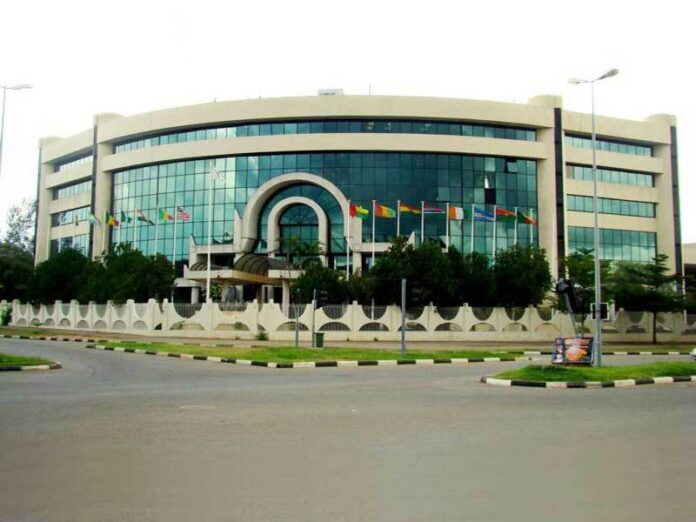Lagos, Sept. 16, 2023: The Nigerian Shippers’ Council (NSC) says the ECOWAS Trade Obstacles Alert Mechanism (TOAM) is a potential tool for the elimination of Non-Tariff Barriers (NTB) across the region.
The Executive Secretary, NSC, Mr Emmanuel Jime said this at the sensitisation workshop organised by the NSC in conjunction with ECOWAS Commission and the United States Agency International Development (USAID) in Lagos on Friday.
The workshop is to create awareness to professional organisation and stakeholders in trade on their role vis-a-vis elimination of Non-Tariff Barriers (NTBs) by using ECOWAS Trade Obstacles Alert Mechanism (TOAM).
According to Jime, the collective focus today revolves around a topic that is not only crucial but timely, given the region’s aspirations for economic growth and regional integration.
“The relevance of our gathering today cannot be overstated. Numerous studies conducted along the borders of West African nations have consistently highlighted the impediments faced by traders, particularly in border crossings and customs clearance processes.
“These barriers, comprising lengthy clearance times, transit checkpoints with unwarranted delays, harassments, exorbitant illegal fees, and demands for bribes, have far-reaching consequences.
“They not only disrupt the seamless flow of goods but also pose a direct threat to our regional integration endeavors.
“We are at a juncture where acknowledging the challenges is no longer sufficient. We have a solemn duty to identify practical solutions that will significantly reduce the prevalence of these obstacles,” he said.
Jime noted that in this pursuit, TOAM emerged as a potent tool, adding that it was officially launched during the second meeting of the ECOWAS Regional Trade Facilitation Committee (RTFC) in November 2022.
He pointed out that TOAM was engineered to mitigate non- tariff barriers across the ECOWAS region, and operate via an online reporting system bolstered by a handpicked interagency network.
The council’s boss added that through this platform, businesses could promptly submit or report obstacles to public sector agencies, receive responses, and remain informed about queries submitted by fellow operators concerning specific products or countries.
According to Jime, TOAM’s initial results are encouraging, as over 400 obstacles have been reported through this mechanism across West Africa with more than 49 per cent of them effectively addressed.
“This was addressed by national focal points representatives, supported by advisory services from the International Trade Centre (ITC).
“The full operational status of TOAM in all 15 ECOWAS member states underscores its potential to drive transformative change and enhance regional trade and the workshop is conducted under the auspices of the Operational Plan 2021-2023 of ECOWAS-USAID.
“We wish to illuminate the pivotal role of professional organisations and private sector stakeholders in eradicating NTBs and advocating for policy reforms.
“Our overarching objective is to bolster ongoing trade facilitation initiatives in West Africa, fostering the seamless and efficient movement of goods in region and beyond while reducing the private sector’s trade related time and cost burdens,” he said.
Jime believed that this opportunity would deepen knowledge, enhance collaboration, and chart a course toward a West Africa where trade flowed smoothly, efficiently, and equitably.
“By collectively, we can dismantle the barriers that impede our progress and lay the foundation for a more prosperous and integrated region,” he said.
Jime also pointed out that the NSC was committed to promoting trade and facilitating seamless cross-border transactions and as such, initiated ideas to sustain it such as establishing Border Information Centre, compliant unit.
Also, Mr Justin Bayili, Principal Trade Advisor, ECOWAP -VSAID Operational Programme, ECOWAS Commission noted that there was need to create good condition for trade facilitation in the region.
According to Bayili, there are many problems faced on the corridor, noting that this should be looked into to proffer sustainable solutions.
“The issue of reporting complaints, ones twice and even the third time without getting response is not good as this will make the person to lose focus.
“Two months ago, we took a trip from Mile 2 to Badagry and experienced 67 checkpoints, this delay goods and thus making the goods costly for the business community,” he said.
The event witnessed some of these stakeholders: Nigerian Ports Authority, freight forwarders, Nigeria Customs Service, Manufacturer Association of Nigeria, Lagos Chambers of Commerce and Industry, National Agency for Food and Drug Administration and others.
Some of the stakeholders that spoke urged stakeholders in the field of trade to ensure that there was sanity in the way they traded, noting that some obstacles experienced were done by them.
They equally expressed concern on the teething problems to be experienced and how to surmount them and called for the truck drivers integration into the scheme by means of sensitising them.
They also noted that the country do not lack on policies, workable ideas but the main issues had to do with implementation, human elements failing us, urging that the policy should work.




